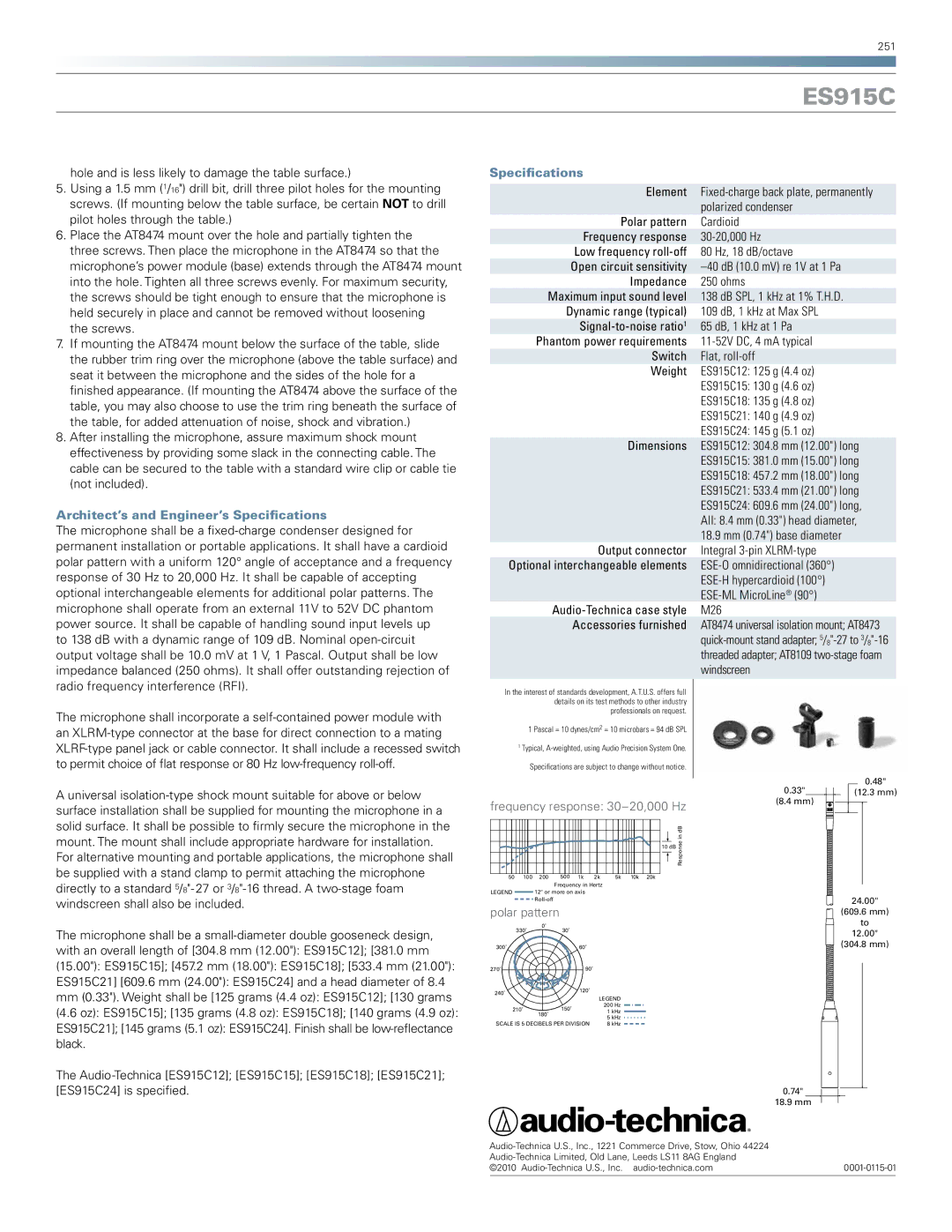
251
ES915C
hole and is less likely to damage the table surface.)
5.Using a 1.5 mm (1/16") drill bit, drill three pilot holes for the mounting screws. (If mounting below the table surface, be certain NOT to drill pilot holes through the table.)
6.Place the AT8474 mount over the hole and partially tighten the three screws. Then place the microphone in the AT8474 so that the microphone’s power module (base) extends through the AT8474 mount into the hole. Tighten all three screws evenly. For maximum security, the screws should be tight enough to ensure that the microphone is held securely in place and cannot be removed without loosening
the screws.
7.If mounting the AT8474 mount below the surface of the table, slide the rubber trim ring over the microphone (above the table surface) and seat it between the microphone and the sides of the hole for a
finished appearance. (If mounting the AT8474 above the surface of the table, you may also choose to use the trim ring beneath the surface of the table, for added attenuation of noise, shock and vibration.)
8.After installing the microphone, assure maximum shock mount effectiveness by providing some slack in the connecting cable. The cable can be secured to the table with a standard wire clip or cable tie (not included).
Architect’s and Engineer’s Specifications
The microphone shall be a
The microphone shall incorporate a
A universal
The microphone shall be a
mm(0.33"). Weight shall be [125 grams (4.4 oz): ES915C12]; [130 grams
(4.6 oz): ES915C15]; [135 grams (4.8 oz): ES915C18]; [140 grams (4.9 oz):
ES915C21]; [145 grams (5.1 oz): ES915C24]. Finish shall be
The
Specifications
Element
Polar pattern Frequency response Low frequency
Maximum input sound level Dynamic range (typical)
Dimensions
Output connector Optional interchangeable elements
Audio-Technica case style
Accessories furnished
In the interest of standards development, A.T.U.S. offers full details on its test methods to other industry professionals on request.
1 Pascal = 10 dynes/cm2 = 10 microbars = 94 dB SPL
1Typical,
frequency response:
|
|
|
|
|
|
|
|
| in dB |
|
|
|
|
|
|
|
| 10 dB | Response |
50 | 100 | 200 | 500 | 1k | 2k | 5k | 10k | 20k |
|
| Frequency in Hertz | ||
LEGEND | 12" or more on axis |
| |
|
| ||
polar pattern |
| ||
330˚ | 0˚ |
| |
30˚ |
| ||
300˚ | 60˚ |
| |
270˚ | 90˚ |
| |
240˚ | 120˚ |
| |
| LEGEND | ||
|
| ||
210˚ | 150˚ | 200 Hz | |
1 kHz | |||
| 180˚ | ||
| 5 kHz | ||
SCALE IS 5 DECIBELS PER DIVISION | |||
8 kHz | |||
Cardioid
80 Hz, 18 dB/octave
138 dB SPL, 1 kHz at 1% T.H.D.
109 dB, 1 kHz at Max SPL
65 dB, 1 kHz at 1 Pa
18.9mm (0.74") base diameter Integral
AT8474 universal isolation mount; AT8473
0.48"
0.33"(12.3 mm) (8.4 mm)
24.00"
(609.6 mm)
to
12.00"
(304.8 mm)
0.74"
18.9 mm
| |
| |
©2010 |
